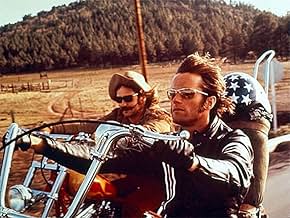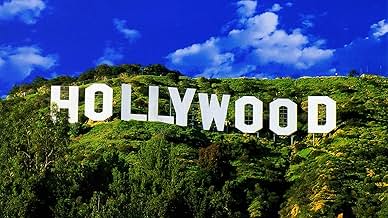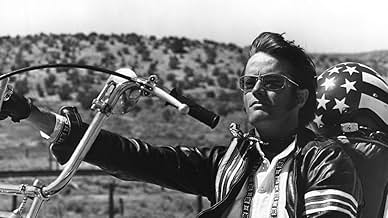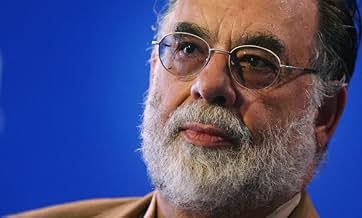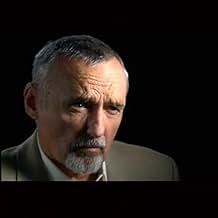Como a Geração Sexo, Drogas E Rock'n'roll Salvou Hollywood
Título original: Easy Riders, Raging Bulls: How the Sex, Drugs and Rock 'N' Roll Generation Saved Hollywood
AVALIAÇÃO DA IMDb
7,5/10
3,2 mil
SUA AVALIAÇÃO
Adicionar um enredo no seu idiomaA look at 1970s Hollywood when it was known as New Hollywood, and the director was the star of the movie.A look at 1970s Hollywood when it was known as New Hollywood, and the director was the star of the movie.A look at 1970s Hollywood when it was known as New Hollywood, and the director was the star of the movie.
- Direção
- Roteiristas
- Artistas
Sam Peckinpah
- Self
- (cenas de arquivo)
- Direção
- Roteiristas
- Elenco e equipe completos
- Produção, bilheteria e muito mais no IMDbPro
Avaliações em destaque
Don't think the point of the book/movie was that the people mentioned have disappeared off the face of the earth -- just that they have never achieved the critical AND commerical heights they achieved in the '70's. Spielberg and Lucas have survived and flourished, but they never had any intentions of CHANGING Hollywood, their films basically fit within an established Hollywood tradition. They were squares, in other words.
I read the book EASY RIDERS, RAGING BULLS by Peter Biskind and was amazed by it... If 'm honest I'm ashamed to say I rarely read for pleasure and it's something that I do meen to put right but EASY RIDERS, RAGING BULLS was an exception. Cliché's like "Couldn't put the book down" spring to mind!
Anyway this was a good, interesting documentary based on the points brought up in Biskind's book!
As a documentary it's very standard but the sheer subject matter makes it a very good 110 minutes of viewing.
Shame some of the big names didn't agree to appear on this film... it would have been so much better!
Anyway this was a good, interesting documentary based on the points brought up in Biskind's book!
As a documentary it's very standard but the sheer subject matter makes it a very good 110 minutes of viewing.
Shame some of the big names didn't agree to appear on this film... it would have been so much better!
I ran across the documentary by accident, and am really glad that I did - having been a slave to film study for the last 17 years of my life, I have read about, viewed documentaries involving, and seen the films of most of the filmmakers profiled in Easy Riders, Raging Bulls so I figured it would make for good background noise while I tended to some writing. What surprised me was that I had to postpone my work because I was literally riveted with this film.
Easy Riders, Raging Bulls chronicles the new wave of filmmakers who revolutionized Hollywood in the late 60's and 70's. While a lot of the stories are relatively well known (the foreign film influence, the problems with the filming of Jaws, the raising of the bar in terms of the box office gross) the candid commentary from the directors, producers, writers and actors that were involved was extremely enlightening and brutally honest. One story that sticks in my mind in particular is the telling by various people of the "Malibu Beach Group" that included Scorsese, Keitel, Spielberg and Paul Schrader among others gathering to party and discuss and debate film. Being a complete film geek, when friends and I get into philosophical discussions about where we would go if we could travel back in time to any moment, my answer has always been to be a production assistant on the set of Citizen Kane. After hearing this story in the documentary, transporting myself back to that scene is a close second. Supplementing these interviews were excellent behind-the-scenes footage that I had never seen of the filmmakers at work, which was absolutely fascinating.
While the documentary skips around according to genre, and not necessarily profiling a single filmmaker at a time, the range of directors presented is admirably wide. The obligatory (and famous) Coppola, Scorsese, Bogdanovch, Lucas and Spielberg are profiled with equal air time as directors who are not household names, like Sam Peckinpah, Arthur Penn and Hal Ashby. This is definitely a great documentary to catch if you want to get some ideas for films that you should watch but don't know are out there, as well as see some of the diverse portfolios the more "commercial" directors have in their pasts.
--Shelly
Easy Riders, Raging Bulls chronicles the new wave of filmmakers who revolutionized Hollywood in the late 60's and 70's. While a lot of the stories are relatively well known (the foreign film influence, the problems with the filming of Jaws, the raising of the bar in terms of the box office gross) the candid commentary from the directors, producers, writers and actors that were involved was extremely enlightening and brutally honest. One story that sticks in my mind in particular is the telling by various people of the "Malibu Beach Group" that included Scorsese, Keitel, Spielberg and Paul Schrader among others gathering to party and discuss and debate film. Being a complete film geek, when friends and I get into philosophical discussions about where we would go if we could travel back in time to any moment, my answer has always been to be a production assistant on the set of Citizen Kane. After hearing this story in the documentary, transporting myself back to that scene is a close second. Supplementing these interviews were excellent behind-the-scenes footage that I had never seen of the filmmakers at work, which was absolutely fascinating.
While the documentary skips around according to genre, and not necessarily profiling a single filmmaker at a time, the range of directors presented is admirably wide. The obligatory (and famous) Coppola, Scorsese, Bogdanovch, Lucas and Spielberg are profiled with equal air time as directors who are not household names, like Sam Peckinpah, Arthur Penn and Hal Ashby. This is definitely a great documentary to catch if you want to get some ideas for films that you should watch but don't know are out there, as well as see some of the diverse portfolios the more "commercial" directors have in their pasts.
--Shelly
This docu makes the misguided error of comparing the careers of Hal Ashby and Steven Spielberg. More different film-makers there have never been. However, by sheer virtue of sharing artistic or commercial success in Hollywood in the same decade, these two anomylous inclusions are lumped in together. Peter Bogdanovich regales us simpletons with his self-encyclopedia, as if he were ever more than a journey-man director. It's intriguing to see the commercial success of The Exorcist and the critical success of Mean Streets sharing the same five minute discussion with various Hollywood talking heads all of whom are past their prime.
One of the rare gems of the film is the sequence recalling how Martin Scorcese, Paul Schrader, George Lucas, Spielberg and many other prominent male film-makers would hang out in the same beach houses in Malibu, but it's only ten minutes long. This is a film obsessed with the tangential perks of that divine spark that was the 70's renaissance of American movies. Presumably this film is based on a best-selling book of the same name, but all this film can sum up is that a bunch of cool movies came out in the 70's, and that, YES, the men who made those movies hung out from time to time. Honestly, you'd be better off just watching every film by the directors that this film interviews and save yourself the thankless task of listening to too many Hollywood has-beens pine for yesteryear. What really happened to these people's careers? Drugs for some, ego for others. Spotty at best, this film just isn't all it could be. 3/10
One of the rare gems of the film is the sequence recalling how Martin Scorcese, Paul Schrader, George Lucas, Spielberg and many other prominent male film-makers would hang out in the same beach houses in Malibu, but it's only ten minutes long. This is a film obsessed with the tangential perks of that divine spark that was the 70's renaissance of American movies. Presumably this film is based on a best-selling book of the same name, but all this film can sum up is that a bunch of cool movies came out in the 70's, and that, YES, the men who made those movies hung out from time to time. Honestly, you'd be better off just watching every film by the directors that this film interviews and save yourself the thankless task of listening to too many Hollywood has-beens pine for yesteryear. What really happened to these people's careers? Drugs for some, ego for others. Spotty at best, this film just isn't all it could be. 3/10
The withering latter-end of 1960s cinema gave birth to a short-lived area of mainstream artistic vision - the 1970s was a decade wherein "the director was the star of the movie." I've never thought of it this way, but as the documentary points out, it's a valid and poignant summary of the time period.
This documentary - based on the best-selling book - offers an in-depth analysis of the film-making process of the 1970s... it starts out with "Easy Rider," from the late '60s, which became a huge box office success despite its profane content and extremely low budget.
The financial success of the movie seemed to spawn a new generation of artistic, low-budget films -- Scorsese and Coppola seemingly leading the revolution onwards.
Dennis Hopper would later fail with his semi-sequel to "The Last Picture Show" (as chronicled here) but other directors had success with their projects, attracting viewers despite the grungy themes of the films.
I've heard that cinema "died" in the 1970s, so far as that people had stopped going to see movies...without the influx of 1980s blockbusters, we might not have films today. I think that's rather a stretch.
If anything "Raging Bulls, Easy Riders" exaggerates the mild box office returns of the decade and tries to compensate for their low intake by citing critical praise for the films...all well and valid, when discussing the artistic merit...not financial gain.
I found this to be a rather enjoyable documentary, but I didn't learn anything I hadn't already known. It's got some good interviews, but they're not as insightful as they are amusing anecdotes.
If you are a film student, you could probably view a better and more in-depth summary of the decade; however, for novices, this is good starting ground.
This documentary - based on the best-selling book - offers an in-depth analysis of the film-making process of the 1970s... it starts out with "Easy Rider," from the late '60s, which became a huge box office success despite its profane content and extremely low budget.
The financial success of the movie seemed to spawn a new generation of artistic, low-budget films -- Scorsese and Coppola seemingly leading the revolution onwards.
Dennis Hopper would later fail with his semi-sequel to "The Last Picture Show" (as chronicled here) but other directors had success with their projects, attracting viewers despite the grungy themes of the films.
I've heard that cinema "died" in the 1970s, so far as that people had stopped going to see movies...without the influx of 1980s blockbusters, we might not have films today. I think that's rather a stretch.
If anything "Raging Bulls, Easy Riders" exaggerates the mild box office returns of the decade and tries to compensate for their low intake by citing critical praise for the films...all well and valid, when discussing the artistic merit...not financial gain.
I found this to be a rather enjoyable documentary, but I didn't learn anything I hadn't already known. It's got some good interviews, but they're not as insightful as they are amusing anecdotes.
If you are a film student, you could probably view a better and more in-depth summary of the decade; however, for novices, this is good starting ground.
Você sabia?
- CuriosidadesMany of the subjects profiled in author Peter Biskind's book, including directors Steven Spielberg, George Lucas, Robert Altman, and 'William Friedkin', declined interviews for the documentary.
- ConexõesFeatures Sombras do Terror (1963)
Principais escolhas
Faça login para avaliar e ver a lista de recomendações personalizadas
Detalhes
- Data de lançamento
- Países de origem
- Idioma
- Também conhecido como
- Easy Riders, Raging Bulls: How the Sex, Drugs and Rock 'N' Roll Generation Saved Hollywood
- Empresas de produção
- Consulte mais créditos da empresa na IMDbPro
- Tempo de duração1 hora 59 minutos
- Cor
- Mixagem de som
- Proporção
- 1.78 : 1
Contribua para esta página
Sugerir uma alteração ou adicionar conteúdo ausente

Principal brecha
What is the Spanish language plot outline for Como a Geração Sexo, Drogas E Rock'n'roll Salvou Hollywood (2003)?
Responda

